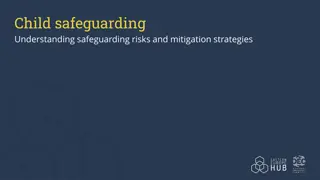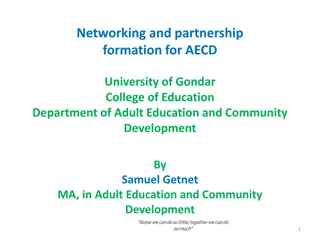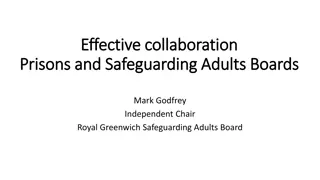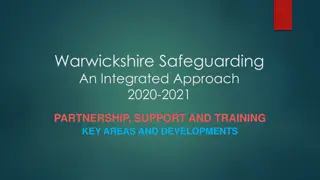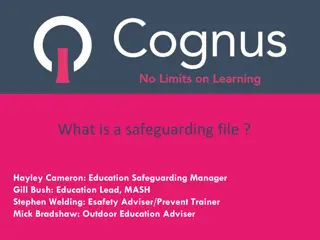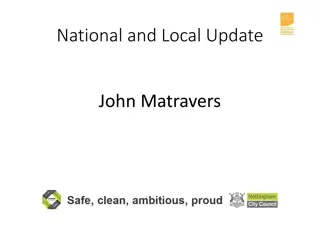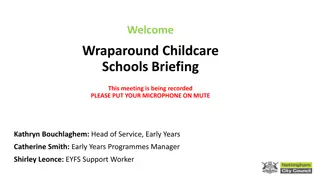Nottingham City Safeguarding Children Partnership Networking Event
The Nottingham City Safeguarding Children Partnership held a networking event focused on improving the attendance of vulnerable pupils. The event featured speakers from various organizations discussing important topics such as Ofsted inspections, supporting families, and education investment projects. The Supporting Families Accredited Practitioner team, consisting of professionals from diverse sectors, highlighted their collaborative approach to ensuring positive outcomes for families. The objective was to enhance connectivity, share updates, and foster mutual support within the safeguarding community in Nottingham.
Download Presentation

Please find below an Image/Link to download the presentation.
The content on the website is provided AS IS for your information and personal use only. It may not be sold, licensed, or shared on other websites without obtaining consent from the author. Download presentation by click this link. If you encounter any issues during the download, it is possible that the publisher has removed the file from their server.
E N D
Presentation Transcript
DSL Network Aims and Purpose To promote connectivity with the Nottingham City Safeguarding Children Partnership, other key local authority departments and Designated Safeguarding Leads across the city Act as a conduit for policy updates A network which demonstrates professional behaviours and mutual support Sharing of pertinent local and national updates focusing on safeguarding priorities and emerging trends across the city of Nottingham Today s objective: Working together to improve the attendance of vulnerable pupils 2
Overview of network content No Agenda Items Speaker John Matravers, Head of Safeguarding Children s Integrated Services-Nottingham City Council 09:30-09:40 Welcome and Outline 1 09:40- 10:05 Ofsted- attendance at point of inspection David Carter, Senior His Majesty s Inspector (HMI)- Ofsted 2 Karen Eaves, Alison Russell and Lorraine Whistler- Supporting Families Accredited Practitioners 10:05- 10:20 Supporting Families Programme 3 Samina Ring, PEIA Attendance Project Lead and Liz Anderson, Education Consultant 10:20-10:40 Priority Education Investment Area (PEIA) Nottingham Attendance Project 4 Elizabeth Browne, Executive Principal RET 10:40- 10:50 Attendance Taskforce - Raleigh Education Trust 5 10.50- 11:00 BREAK 10 minutes 6 Sophie Coldrick and Samantha Law, Education Welfare Specialist 11:00-11:45 Education Welfare Service 7 Local Updates/ National Updates and close Ben Osifo, NCSCP Business Manager and Claire Maclean, School and Education Safeguarding Coordinator 11:45-12:00 8 3
Embed WHOLE FAMILY working across the partnership using a wider range of thematic areas taking into account post COVID recovery for our families
The Supporting Families Accredited Practitioner team is a multi The Supporting Families Accredited Practitioner team is a multi- -agency team of people working closely together, team include Accredited Practitioners from Police, Health, Schools, Housing, Education Welfare, CAMHS and Supporting Families Employment Advisors from the DWP. agency team of people working closely together, sharing information, for the best outcomes for families. The Accredited Practitioners: Accredited Practitioners: Service Manager Service Manager Ronnie Fairley Operational manager Operational manager Paul Martin Health Health - Julia Smith Police Police - Joy Davis Schools/Education Schools/Education Alison Russell Schools/Education Schools/Education- - Lorraine Whistler Schools/Education Welfare, Change, Grow, Live, Youth Justice Service Schools/Education Welfare, Change, Grow, Live, Youth Justice Service - Karen Eaves CAMHS CAMHS Laura Green Housing/Homelessness Housing/Homelessness Hilary Fyfe Hardy PBR PBR- - Patrick Allison DWP DWP - - Nicola Brindley, DWP DWP- Monica Bryce DWP DWP- - Kay Attenborough Data Analyst Data Analyst- Jack Reilly Data Analyst Data Analyst- - Reece Ricketts Project Officer Project Officer- -Kate Thurman Supporting Families Project Manager Supporting Families Project Manager- - Hester Kapur
10 Thematic areas. Education Early Years development Physical & Mental Health Drugs, Alcohol & Substance Family Relationships Child Exploitation Crime Domestic Abuse Housing Financial Stability
DATA MATURITY DEVELOPMENT Data Accelerator Fund (circ .5m) This money is funding the Partner Pathway Partner Agency Access This is currently in the Final stages of security and is being discussed with School Trusts. It has also been used for Supporting Families training and developing the E-learning platform for our partners to access for their own learning development. Dashboard (Stage 2 consultation) The dashboard is currently at Early stages and is with the Information Governance.
Contact Details Contact Details Supporting Families Coordinator Supporting Families Coordinator: Veronica Fairley (Ronnie) Email: Email: Veronica.fairley@nottinghamcity.gov.uk Tel: Tel: 0115 8763606 Schools Accredited Practitioners : Schools Accredited Practitioners : Alison Russell Alison.russell@nottinghamcity.gov.uk Tel: : 07895212609 (Redhill Academy Trust, Archway Learning trust, Djanogly trust, NST & Fernwood School Academy) Karen Eaves Karen.Eaves@nottinghamcity.gov.uk Tel: 07947198862 (Raleigh trust, Transform trust, Creative trust & Our lady Of Lourdes Multi Academy trust) Lorraine Whistler Lorraine.whistler@nottinghamcity.gov.uk Tel: 07949185314 (Nova Education Trust, Greenwood Academies Trust, LEAD Academy Trust, Flying High Trust, Believe Academy Trust, NST, Shine Multi Academy Trust, Spencer Academies Trust & Bluebell Primary. Contact us . If you are a lead professional working on a Early Help case or have any queries to do Contact us . If you are a lead professional working on a Early Help case or have any queries to do with whole family working. with whole family working.
For the 2 day Supporting Families Training contact Kate Thurman. Email : Email : pfid2@nottinghamcity.gov.uk pfid2@nottinghamcity.gov.uk
Expectations 14
Education Neglect The Department for Education (DfE) has stated: Persistent failure to send children to school is a clear sign of neglect. The NSPCC has cited, failure to ensure regular school attendance which prevents the child reaching their full potential academically as one of their four forms of neglect. Physical neglect: not meeting a child s basic needs, such as food, clothing or shelter; not supervising a child adequately or providing for their safety Educational neglect: not making sure a child receives an education Emotional neglect: not meeting a child s needs for nurture and stimulation, for example by ignoring, humiliating, intimidating or isolating them Medical neglect: not providing appropriate health care (including dental care), refusing care or ignoring medical recommendations (Horwath, 2007). 15
Things to Consider Does your school Safeguarding Policy include, and link to, your Attendance Policy? (and vice versa) How often do you review your Safeguarding and Attendance Policy? Does your safeguarding practice differ for vulnerable children who are repeatedly absent from school, in comparison to children that you do not have concerns about? Do you hold more than one emergency contact number for the children? How often are these details checked? How forensic are you with the recording of information? Has everyone had safeguarding update training pertinent to their role? 16
What do you have in place? Whole school culture that attendance is everyone s responsibility Specific pathway for vulnerable children Pastoral support Effective home-school communication Home visits Attendance Policy Attendance improvement plans for PA Use of Pupil Premium 18
The Triage Process Data driven Children for support identified by the school under the given criteria (41% - 70%, no agency involvement) School visit to discuss children for referrals Referrals are screened at a Triage Meeting Cases accepted for support: Attendance Family Support Workers or Attendance Taskforce (Raleigh) 5 days to submit request for service 6 week intervention 21
Roll-Out Cases Total Cases Triaged Number of Cases Declined Number of Cases Accepted Cases Assigned to AFSW Cases Assigned to Attendance Taskforce Families Not Engaging Primary Secondary Total 45 71 116 15 25 40 30 48 78 19 16 35 1 27 28 0 4 4 25
Engaged Cohort 68 pupils have currently been engaged with by the taskforce and the Family Support Team (approximately, engagement numbers are fluid) From the start of term (Autumn 2023) 14 pupils have recorded an increase in attendance, comparing their first week to their overall attendance for the year From the start of term (Autumn 2023) 16 pupils have recorded an increase in attendance, comparing their first week to their latest full week 26
Learning so far Context is all! Importance of data and proper interpretation Engage rather than judge Positive Culture Engaging Curriculum 28
Next Steps Extending to further wards Establishing a Resource Bank Working with our Nottingham Attendance Hub - Bluecoat Wollaton Further CPD opportunities 29
Samina.Ring@Raleightrust.org liz@lizanderson.org 30
What support does the Attendance Taskforce Team offer? Safeguarding responsibilities 31
BREAK 32
Mel Barrett CEO of Nottingham City Council Introduction to The Education Welfare & EOTAS Service Catherine Underwood Corporate Director for People Nick Lee Director of Education Jennifer Hardy Head of Access to Learning Karen McAndrew Education Welfare Service Manager Children Missing Education Education Welfare Service Legal Intervention EOTAS and EHE 34
Attendance Improvement Strategy 2023-24 Nottingham City Council Attendance Improvement Strategy 2023/24 Produced in response to the DfE guidance Working Together to Improve School Attendance Cover s NCCs universal offer to work in partnership to improve attendance NCC are responsible for 4 core functions: 1: Communication and advice 2: Targeting Support Meetings 3: Multi disciplinary support for families 4: Legal intervention Based on learning from 2 pilot projects NO additional resource for the service 35
The Education Welfare Service Our offer What do we do? North, South and Central clusters Linked EWO for each school Best practice support relating to school attendance Support and training to help improve whole school attendance and reducing persistent absenteeism Potential cases for consideration can be discussed at this time book a slot! Dedicated day per week for school to contact their EWO Purpose is to identify, discuss and agree targeted actions for vulnerable groups, PA and SA pupils and those at risk 3 Targeting Support Meetings a year 36
How to refer a pupil to the service Referral link Schools will refer pupils to the Education Welfare Service if: A pattern of irregular attendance, lateness or persistent absenteeism is worsening Parents do not accept their responsibilities for ensuring their child attends school and are refusing to discuss the matter A Request for Service must be agreed with the schools linked EWO and should be submitted the online form https://nottinghamci ty- dash.achieveservice. com/service/Request _for_Service_Form Since September 2023, EWS have accepted 256 referrals (Requests for Service, Elective Home Education and Check and Challenge) Referral link Agencies or citizens will refer children to the Education Welfare Service if: They have noticed a child who does not appear to be attending school regularly They believe that a child is not receiving any education All Check and Challenge referrals are submitted online via the online form https://myaccount. nottinghamcity.gov.u k/service/check_and _challenge 37
Legal Intervention Jackie Richardson-Martin David Hughes James Verran 38
Legal Intervention Prosecution is the end of the line and only considered when all other options have failed. There should have been voluntary support, formal support before any legal intervention under The Education Act, 1996 We must follow the code for Crown prosecutors and only prosecute when we consider there is a realistic chance of conviction. We have to review cases objectively, fairly and impartially. Any legal response has to be timely and reflect the evidence of the case. E.g. Penalty Notices, s444(1) and s444(1A) prosecutions. School Attendance Order prosecutions or Education Supervision Orders Just because we can prosecute does not mean we should 39
School year 2022-23 3,247 Penalty Notices issued 79% PN payment rate 108 received results 444(1) prosecutions 35 444(1A) prosecutions 18 warrants 40
Elective Home Education Jodi Stead Olga Brock 41
Elective Home Education School receives written notification from parent that a pupil is receiving education otherwise than at school The numbers: - There have been 116 new EHE learners added this academic year (18.01.24) - Total number of EHE learners: 530 (381 secondary/149 primary) - KS 4 is the largest cohort: 212 learners DfE guidance states schools must remove the child from roll from this point Removal from roll is at the discretion of the Head Teacher DfE directive means the three way meeting is no longer offered School must refer via online referral link Following acceptance of referral, EWO will make contact with the school and begin their case work which includes safeguarding checks Referral form: https://myaccount.nottinghamcity.gov. uk/service/school_elective_home_edu cation The child is now the responsibility of the Local Authority and, if there are no concerns, the child will be subject to an annual educational review More vulnerable learners are checked more regularly and the EHE Manager and EHE Specialist meet weekly to discuss safeguarding concerns 42
Children Missing Education James Maclean Wayne Smith Emma Newton CME.EducationWelfare@nottinghamcity.gov.uk 43
Children Missing Education (CME) Admission: Schools should as routine obtain: The child s last address, whether that address is in the UK or abroad Details of any previous school for the child (especially if the child was schooled outside of the UK) Nationality and home language spoken Any email addresses used by the parent and/or young person All emergency contact details Any removal from school roll must comply with The Education (Pupil Registration) (England) Regulations 2006 Notification of intention to leave (even temporarily e.g. Holiday) The address where they will be staying and a return date The outgoing and return flight numbers Any email addresses used by the parent and/or young person All emergency contact details Leavers: Schools should as routine record The forwarding address Any details of the school they will be attending, whether in this country or abroad 44
When the pupil leaves without notification: Check that the accommodation has been vacated, remember they are not missing if they are still living at the same address, they are non-attenders. Collect and collate all the relevant information about the family when completing the online CME referral https://myaccount.nottinghamcity.gov.uk/service/children_missing_education_referral Where a pupil has not returned to school for ten days after an authorised absence or is absent from school without authorisation for twenty consecutive school days, the pupil can be removed from the admission register when the school and the local authority have failed, after jointly making reasonable enquiries, to establish the whereabouts of the child. This only applies if the school does not have reasonable grounds to believe that the pupil is unable to attend because of sickness or unavoidable cause. The final decision about removing a child from a school roll remains with the Head Teacher of the school after consultation with the Local Authority (CME Officer who is involved ). 45
Cluster Meetings North, Central and South There will be one cluster meeting per term The additional Education Welfare Specialist will support with the implementation. Education Welfare Officers will take turns in chairing the meetings There will be a set agenda and minutes taken Aim of the cluster meetings (for schools): To provide a space for collaboration between schools that are within the same geographical area, such as schools previously attended and the schools of any siblings To work with schools and the Local Authority; sharing effective practice where there are common barriers to attendance Speakers will be invited to the meetings 47
DfE Attendance Campaign The DfE has recently launched a national attendance campaign, attached is a newsletter about the campaign and what is on offer for schools. see below for what s happening within the campaign. The campaign seeks to influence parents and carers views on the importance of school attendance. To promote the importance of school attendance and the value of a school day, the national communications campaign will include: Promoted social media advertising Media partnerships Radio advertising Social media influencers When? Campaign activity will take place January to March 2024. The campaign reflects feedback from schools and local authorities. It forms one part of our wider strategy to increase attendance, which also includes clearer expectations for schools and local authorities built around a support first approach. Read all about it in our Education Welfare & EOTAS January 2024 Newsletter 48
Case Study 1 The mother of Child A has observed a change in his behaviour and emotional wellbeing. He has become more withdrawn from social activities, less confident and is tearful when discussing school. His outbursts of anger are becoming more regular and the change in his behaviour started once he started secondary school. Child A has a diagnosis of ADHD and cerebral palsy and is working with a paediatrician on an ASD assessment. School have observed that Child A is trying very hard to manage without mobility aids however, he struggles to keep up with his peers and tends to get left out a lot. Child A has previously refused to engage with the CAMHS pathway. There are no other agencies working with the family. Child A s school attendance is 0% and he has not attended full time school for 2 and a half years. School have submitted a referral to the Education Welfare Service. What questions would you ask school in order to establish more facts and support Child A? 1. What education provision would you recommend for Child A? 2. Do you think a referral to the Education Welfare Service is appropriate? 3. 49
Case Study 2 Child B,C and D are severe absentee s and have been on a Child Protection Plan since 2021 due to sexual abuse and neglect. Child B s attendance is 0%, Child C s attendance is 43% and Child D s attendance is 34%. Their attendance has been historically poor and school referred them to the Education Welfare Service in 2023. The child protection chair is concerned about the children's sexualised behaviour and the historical concerns around sexual harm. There are three adults around the children, mother, mothers partner who lives at home address and father who has his own flat but is at the home address everyday with the children. There are issues with guidance and boundaries in the home. When school contact mum about the children's attendance, she is evasive and difficult to get a hold of. When the children are in school they are tired and find it difficult to concentrate. Concerns also include mum's mental health, possible drug use and mum's general health. Should the family have been referred to the Education Welfare Service sooner? 1. What should the DSL s role be? 2. What do you think the outcome should be? 3. 50






